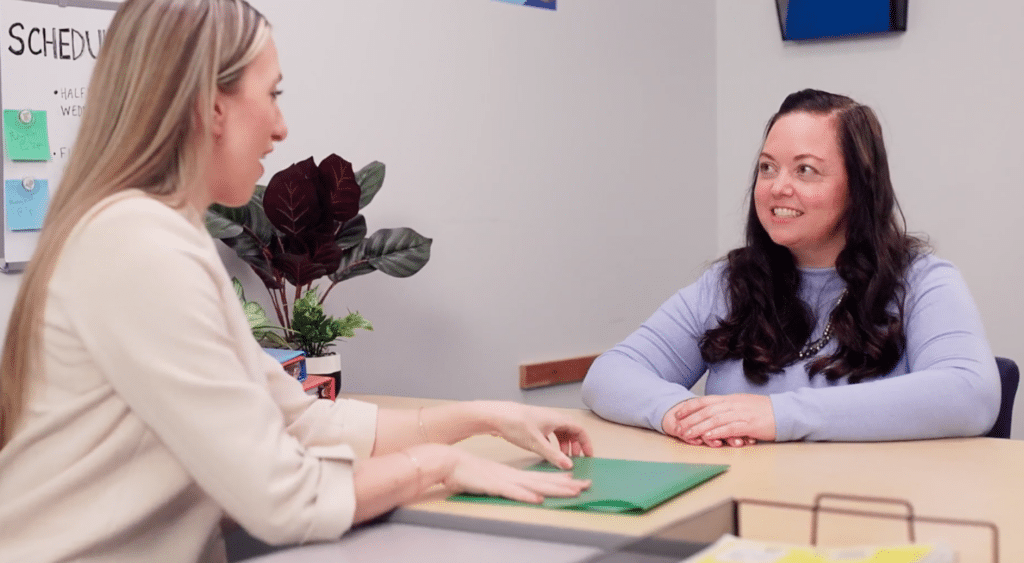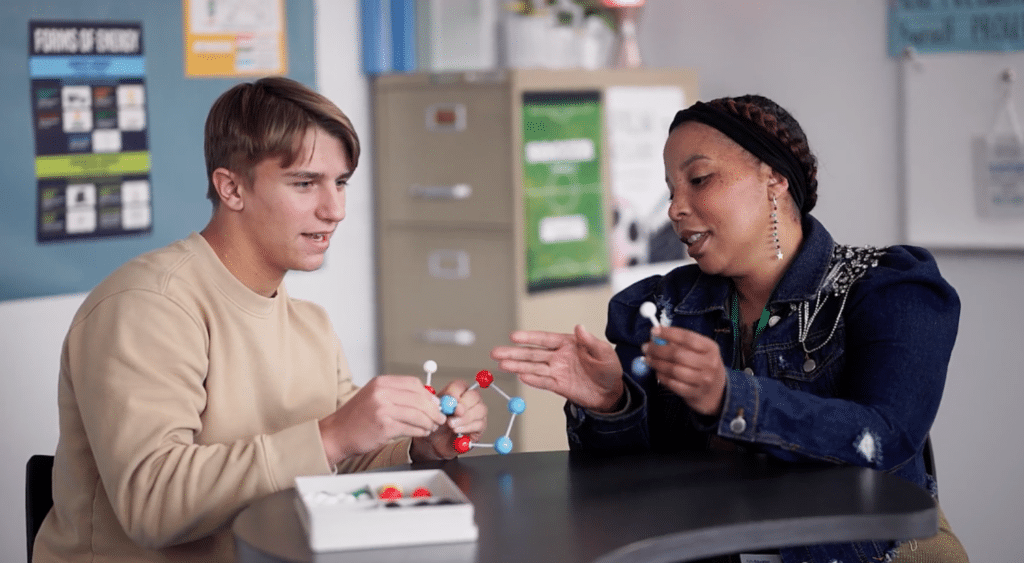How to start a teaching career by first becoming a substitute teacher.

Whether you’ve always dreamed of working in a school or are curious about what it takes to help students learn each day, substitute teaching can be a great way to start a teaching career.
Becoming a substitute teacher provides a preview into the teaching profession — and all roles in schools — that can only be seen from the inside.
Kelly Education works with hundreds of districts across the U.S. to recruit and hire tens of thousands of substitute teachers, paraeducators, tutors, and support staff each year. Many of our substitute teachers consider the work as an introduction or start to a teaching career. Many of our substitute teacher candidates tell us that they are looking for one of the following in their next job. Maybe you can relate?
- You’re actively pursuing a teaching certificate and want some experience in a classroom.
- You think you want to become a teacher but have little or no experience working in a school.
- You’ve volunteered in classrooms or summer camps and want to continue working with students.
- You want a job with some flexibility with weekends, holidays, and summers off.
- You’re passionate about a specific subject area and want to share your expertise with students.
- You’re an advocate who wants to make a difference in student’s lives and in your community.
If this sounds like you, you’re on the right track.
How to start a teaching career as a substitute teacher.
The teaching profession comes with countless options. What grade level would you like to teach? Have you decided on a subject area, grade-level, or specialty? With substitute teaching, you can explore which subjects and age groups you’re most passionate about.
Substitute teachers also interact with other educators and support staff—including school counselors, social workers, special education teachers, speech and language pathologists, physical and occupational therapists, school resources officers, and more. Substitute teaching gives you access to the people doing those jobs right now. Make the most of the experience to learn more about their roles.
Once you’ve worked in classrooms as a substitute teacher, you’ll be much better equipped to make decisions about your future career.
It will get your foot in the door.
Not only will you be earning money doing on-the-job training, you’ll also be making connections and building your personal brand with people who may become your colleagues in the future. It’s your time to shine. School administrators will notice your effort and adherence to school policies and procedures. When a full-time position becomes available, you’ll be top of mind for hiring.
Even if a position doesn’t open in your school or district, this new network has the power to help you down the road. We’ve seen it happen often; the connections made as a substitute teacher serve as fantastic references.
You’ll pick up new skills.
Substitute teaching is a great way to sharpen skills that are transferrable to other roles. The time you spend in the classroom will improve your public speaking, time management, leadership, problem-solving, and presentation skills.
You’ll also become proficient in school technology tools and applications. These skills can be added to your resume and put you above the competition. You may also have valuable access to attend workshops and professional development opportunities that not only improve your practice as a substitute teacher, but also make you a stronger candidate for future jobs.
It will provide flexibility for your other obligations.
Need a meaningful education job that offers flexibility? You won’t be working on weekends, holidays, or most of the summer. This could be ideal if you have school-aged children, as you work when they’re at school.
Additionally, unless you commit to a long-term placement — for example, if the full-time teacher is on parental leave — you’ll have the flexibility to work days that fit with your schedule.
Substitute teacher responsibilities.
Not sure what a substitute teacher does? The duties and responsibilities detailed in a substitute teacher job description generally fall into these categories:
- Maintaining a safe and appropriate learning environment.
- Using the teacher’s lesson plans to provide instruction and keep learning moving forward in the teacher’s absence.
- Communicating with the teacher and school about student progress.
- Preparing classwork and materials
- Collecting, organizing, and reviewing student work.
- Keeping records of students’ work and activities
Getting started in a substitute teaching career.
The specific requirements to become a substitute teacher depend largely on your state and district. In some states, you need a high school diploma or equivalent to work as a substitute teacher. Other states require an associate or bachelor’s degree. So, start by looking up your state’s requirements and/or district’s job description posting to ensure you’re eligible.
Whether you’re currently working towards your teaching certification or simply exploring meaningful career possibilities, now is the time to gain valuable classroom experience so you can eventually start a teaching career.
Fill out our brief interest form and one of our recruiters will contact you to answer your questions and share more about opportunities to start as a sub teacher with one of our school district partners.
View Related: Article Job searching
You might like
Do substitute teachers get health benefits?
3 minute read
What a substitute teacher does.
4 minute read
Do substitute teachers get health benefits?
3 minute read
What a substitute teacher does.
4 minute read
Find your next job
Discover thousands of temporary, full-time, and remote jobs for beginning and experienced job seekers.



